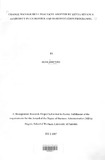| dc.description.abstract | The objective of this study was to determine the Change Management Practices adopted by KRA. The study was conducted through a case study of KRA. Six respondents from the firm were interviewed and then asked to fill a semi-structured questionnaire.
It was found that there have been a lot of changes in the firm that have prompted the management to effectively manage change. New departments have been created, others merged while others split in a bid to deliver better services to clients. Similar to organizations, resistance to change was inevitable but the management was able to contain the pressures that wanted status quo to prevail. The changes have been mainly internal where the change agents have been incorporated into the management system to specifically deal with the issue of change management. Through the strategic plan, KRA has laid down the objectives that each department has to channel its resources and energy towards. The company had long anticipated the changes and had prepared itself to embrace them and deal with those who do not believe in questioning why things must remain the same.
It can be concluded that in undertaking the Reform and Modernization Program, KRA’s management should consider that change management, communication, automation and staff involvement are essential components that will determine program success. Priorities are to ensure that from the onset and throughout the reform period, comprehensive change management and communication initiatives are undertaken and that there is technical capacity to design a credible implementation strategy. This will facilitate the necessary buy-in from management and staff, and the wider public and ensure reforms are implemented on a common platform. While reforming itself, KRA has to consider regional issues such as the development of the East African Community, and the move towards the East African Federation. Consideration will be given to what the other East African countries are undertaking in reform of their revenue bodies. | en |

